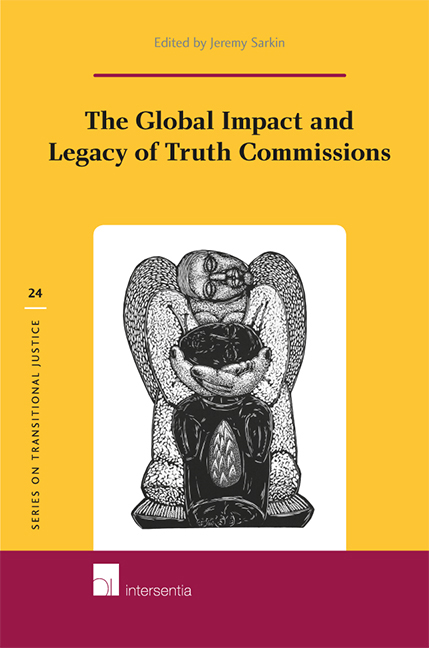Book contents
- Frontmatter
- Acknowledgements
- CONTENTS
- List of Contributors
- Introduction: Contextualising and Understanding the Global Role, Impact and Legacy of Truth Commissions
- Is Anyone Listening? A Review of the Research on Attitudes Towards Truth Commissions
- Assessing the Long-Term Impact and Legacy of Truth Commissions
- The Global Textual Legacies of Truth Commissions: Narratives on Sexual Violence in the Reports of Sierra Leone, Liberia, Kenya and Beyond
- The Implementation Record of Truth Commissions’ Recommendations in Latin America
- In the Aftermath of Truth: Implementing Truth Commissions’ Recommendations on Reparations – Following Through for Victims
- Truth Commissions and Social Justice: ‘Wishful Thinking or Not Very Thoughtful Wishing’?
- Transitioning Toward Dignity
- Towards an Understanding of How Truth Commissions Can Use Their Amnesty Powers to Enhance Their Impact and Legacy
- Truth Commissions in Non-Transitional Contexts: Implications for Their Impact and Legacy
- Surrogacy and Resistance: Evolving Patterns in Unofficial Truth Commissions and Truth Projects
- Index
Introduction: Contextualising and Understanding the Global Role, Impact and Legacy of Truth Commissions
Published online by Cambridge University Press: 26 June 2019
- Frontmatter
- Acknowledgements
- CONTENTS
- List of Contributors
- Introduction: Contextualising and Understanding the Global Role, Impact and Legacy of Truth Commissions
- Is Anyone Listening? A Review of the Research on Attitudes Towards Truth Commissions
- Assessing the Long-Term Impact and Legacy of Truth Commissions
- The Global Textual Legacies of Truth Commissions: Narratives on Sexual Violence in the Reports of Sierra Leone, Liberia, Kenya and Beyond
- The Implementation Record of Truth Commissions’ Recommendations in Latin America
- In the Aftermath of Truth: Implementing Truth Commissions’ Recommendations on Reparations – Following Through for Victims
- Truth Commissions and Social Justice: ‘Wishful Thinking or Not Very Thoughtful Wishing’?
- Transitioning Toward Dignity
- Towards an Understanding of How Truth Commissions Can Use Their Amnesty Powers to Enhance Their Impact and Legacy
- Truth Commissions in Non-Transitional Contexts: Implications for Their Impact and Legacy
- Surrogacy and Resistance: Evolving Patterns in Unofficial Truth Commissions and Truth Projects
- Index
Summary
INTRODUCTION
Globally, truth commissions, Often termed truth and reconciliation commissions, are popular options to deal with aspects of a country's violent past, despite the extensive criticisms levelled against them. Some claim that truth commissions are not the best choice. Call indicates that the major flaws of truth commission processes are that they Often serve as's econd best ‘mechanisms to judicial punishment. He argues that their reports are incomplete because in some cases only victims testify and because they lack funding. It has also been argued that truth commissions’ have recurrent, structural problems, ranging from limited resources to the politicization of the process to virtual impunity for a wide number of off enders’. However, Martha Minow has argued that truth commissions’ are not a second best alternative to prosecutions… When the societal goals include restoring dignity to victims, offering a basis for individual healing, and also promoting reconciliation across a divided nation, a truth commission may be as or more powerful than prosecutions.‘ It has also been said that truth commissions are no longer’ a political compromise [there has been a shift from them] being the “weaker alternative” to trials to a practice that is morally equal and complementary to the judicial option’. These institutions play pivotal roles in a number of respects, including truth recovery and aiding a society to repair the wounds that exist amongst victims and perpetrators and amongst divided groups. This view is not accepted universally and some have doubts about the roles these institutions play. However, the use and strength of truth commissions in regard to truth lies in creating complete records of human rights abuses, including the nature and extent of the crimes and the names and fates of the victims. While in some instances the reports issued by truth commissions include the identities of persons who gave the orders for human rights violations, as well as those who executed the orders, mostly such names have been omitted for political reasons. However, truth commissions can play a multitude of roles in addressing past human rights violations.
- Type
- Chapter
- Information
- The Global Impact and Legacy of Truth Commissions , pp. 1 - 44Publisher: IntersentiaPrint publication year: 2019
- 2
- Cited by

